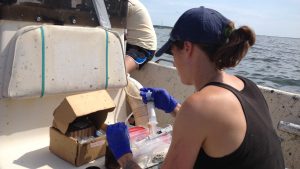Search results for: really%20cheap%20airline%20tickets%20from%20seattle%20phone%20number%201-800-299-7264
We Have Met the Enemy and It Is Us
We Have Met the Enemy and It Is Us Helpful to educators and students. Hendrickson, L. and G.S. Giese In: Hornig, D. (ed.) State of the Cape 1994: Progress Toward Preservation, Association for the Preservation of Cape Cod, Orleans, MA, pp. 157-174, 1994 WHOI-R-93-008
Read MoreCitizen Science: Improving Water Quality in Waquoit Bay
Citizen Science: Improving Water Quality in Waquoit Bay By Dr. Nicole Millette Nicole Millette in the lab March 2018 – Nutrient pollution, particularly nitrogen, is a widespread problem in coastal waters, and a vexing issue for environmental managers as well as those living near these waters. As a Sea Grant-funded Postdoctoral Fellow in Marine Policy,…
Read MoreShrink Wrap Recycling Program
Boat Shrink Wrap Recycling Program KEEP CONTAMINATION OUT OF RECYCLING WHOI Sea Grant partners with Cape Cod Cooperative Extension and transfers stations at towns across the Cape to conduct an annual boat shrink wrap recycling program. Over the years the program has expanded from a single container in a WHOI parking lot to collection sites…
Read MoreDiseases, Pests, and Predators of Concern to New England Shellfish Growers
Diseases, Pests, and Predators of Concern to New England Shellfish Growers Walton, W. brochures, 2005 WHOI-H-05-002, 003, and 004 Also available as PDF files by clicking on the topic of interest: diseases, pests, predators If you are a shellfish grower, harvester, or resource manager, you are well aware that diseases, pests, and predators are issues…
Read MoreRhythmic Beach Cusp Formation: A Conceptual Synthesis
Rhythmic Beach Cusp Formation: A Conceptual Synthesis Seymour, R.J. and D.G. Aubrey Marine Geology, Vol. 65, pp. 289-302, 1985 WHOI-R-85-017
Read MoreKnauss Fellow Profile: Amanda Dwyer
Amanda Dwyer, a 2020 Knauss Fellow, might not be having the typical fellowship experience, due to COVID-19 outbreak and the need to shelter in place, but she’s not letting that stop her work as a Marine Debris Program Specialist, focusing on a new zero waste initiative for National Ocean Service (NOS) offices. The zero waste…
Read MoreCellular Localization of CYP3A Proteins in Various Tissues from Pilot Whale (Globicephala melas)
Cellular Localization of CYP3A Proteins in Various Tissues from Pilot Whale (Globicephala melas) Celander, M.C., M.J. Moore, and J.J. Stegeman Environmental Toxicology and Pharmacology, Vol. 8, pp. 245-253, 2000 WHOI-R-00-009
Read MoreWHOI-R-07-001 Valentine P.C. Ecological Ob
WHOI-R-07-001 Valentine P.C. Ecological Ob
Read MoreSome Determinants of Maturation in Brook Trout, Salvelinus fontinalis
Some Determinants of Maturation in Brook Trout, Salvelinus fontinalis McCormick, S.D. and R.J. Naiman Aquaculture, Vol. 43, pp. 269-278, 1984 WHOI-R-84-019 Size, age, growth rate and photoperiod (the controlling effects of the length of the day on phenomena such as reproductive cycles in mammals, migration patterns in birds, flowering in plants) were examined for their…
Read MoreUnderstanding the Waquoit Bay Ecosystem
A Q&A with Sarah Foster Sarah Foster is a Boston University graduate student doing her dissertation research in Waquoit Bay (Cape Cod, Massachusetts). A biogeochemist, Sarah investigates the impact hypoxia, or low oxygen, in the water has on crucial functions within Waquoit Bay’s ecosystem. She recently published research she and her co-author, Wally Fulweiler conducted in…
Read More

